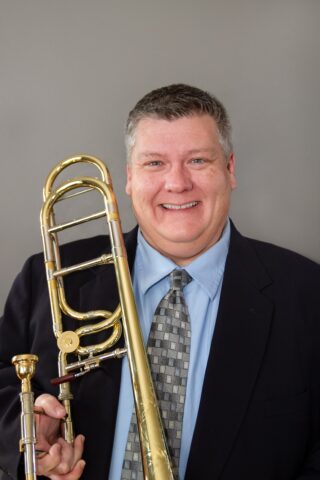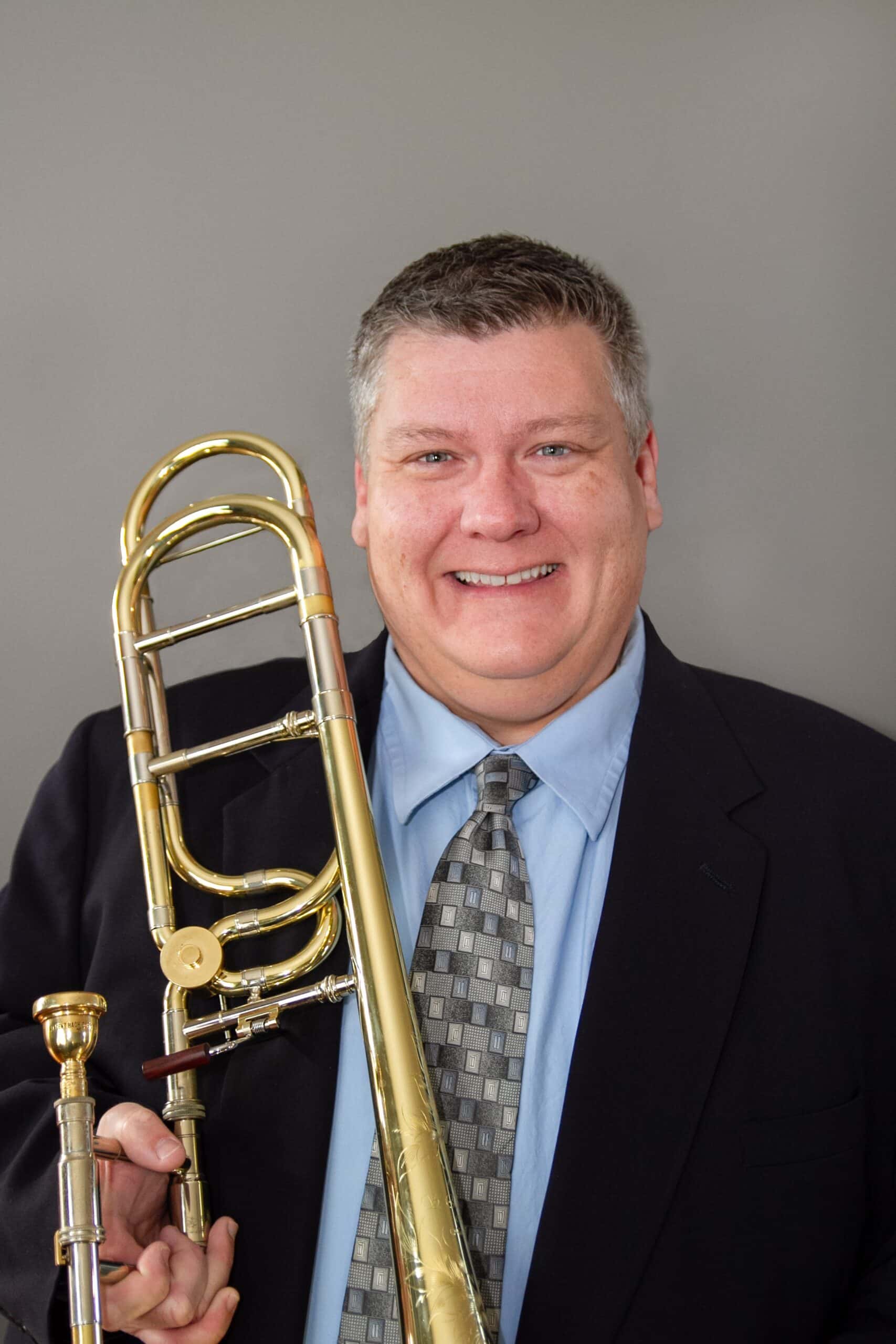CMPI trombone faculty member Timothy Riordan knows how to fix any technique problems his students face because he has encountered most of them himself.
 Introduced to the trombone at an early age by his grandfather, himself a trombonist for 70 years, Riordan didn’t have a private teacher until he was 18 years old. “[My grandfather] gave me my first trombone at age seven. He told me to ‘purse your lips like you’re going to kiss a girl, and blow’ – that’s just about the worst advice I can think of,” Riordan recalled. Nevertheless, Riordan continued to play throughout his youth, and joined his school’s band program at age nine. “I focused a lot on extracurriculars. I was into football, shot put, discus, choir, chess team, I was in every school play, and I was heavily involved in the speech team. Music was just one part of my life, but it’s what I loved the most,” Riordan shared.
Introduced to the trombone at an early age by his grandfather, himself a trombonist for 70 years, Riordan didn’t have a private teacher until he was 18 years old. “[My grandfather] gave me my first trombone at age seven. He told me to ‘purse your lips like you’re going to kiss a girl, and blow’ – that’s just about the worst advice I can think of,” Riordan recalled. Nevertheless, Riordan continued to play throughout his youth, and joined his school’s band program at age nine. “I focused a lot on extracurriculars. I was into football, shot put, discus, choir, chess team, I was in every school play, and I was heavily involved in the speech team. Music was just one part of my life, but it’s what I loved the most,” Riordan shared.
When it came time to apply to colleges, Timothy’s mother orchestrated a meeting between Riordan and the teacher who would come to profoundly shape his future. “My mom told me that before I went into music, she wanted me to find out whether I was good enough. She called the box office of the Chicago Symphony and asked for the phone number of a CSO trombonist. [In a sidenote, Mr. Riordan emphasized that “you shouldn’t do this!”] “She ended up being connected with Northwestern University and reached Frank Crisafulli, a former member of the Chicago Symphony,” Riordan recounted. “Frank told my mom that he didn’t teach high school students anymore,” but she insisted, and eventually Crisafulli agreed to listen to Riordan for 15 minutes between lessons with his Northwestern students.
Riordan remembers that first encounter with Crisafulli in vivid detail. “I was playing on a small-bore trombone [a model designed for younger students]. After about five minutes of playing, [Crisafulli] got up and went to the other room. When he came back, he kept throwing more and more music on the stand, asking me to play more stuff.” Fifteen minutes quickly turned into 30, then 60. “We spent almost three hours together that day,” Riordan laughed. “When he went into the other room that first time, he canceled all his lessons for the day. He called the trombone teachers at top schools — I could hear him on the phone — and said ‘this kid doesn’t know anything, but he’s extremely talented. I’ll keep working with him until he auditions.’ He came back and told me what I needed to do to audition.”
Riordan continued working with Mr. Crisafulli leading up to his college auditions and ended up being offered a full tuition scholarship to New England Conservatory and Eastman. Riordan ultimately chose to attend the Eastman School of Music. Looking back on that time, Riordan shared that “without Frank Crisafulli I probably would have gone to Eastern Illinois and become a band director. It’s why I want to be involved in CMPI — to teach these kids what I didn’t know at the time. When I got to Eastman, I didn’t know anything about theory, tenor clef, or how to tune chords. I was the worst trombonist at Eastman when I got there, but by senior year I was the first trombonist in many years to be nominated for the Performer’s Certificate.”
While Riordan’s training at Eastman put him on the path to become an orchestral trombonist, he found himself drawn to teaching. “I won the first two auditions I took,” Tim remembered, “but I hated playing in an orchestra. I didn’t like the politics. There didn’t seem to be much joy.” Tim’s first student was his younger sister, who he taught over the phone from Rochester. When they could no longer afford the phone bill, Tim’s family connected his sister with the Merit School of Music. She now has a thriving trombone studio in Chicago’s northwest suburbs, working with over 50 young trombonists.
Describing his teaching philosophy, Tim shared that, “I want to make sure my students continue to love the instrument.” He added, “I count as sacrosanct a student’s ability to continue to teach themselves. I don’t solve everything for them, but I provide them ways to get to the solution and steer them away from pitfalls. Because I taught myself for so long, I can fix any problem a student has because I’ve fixed them all in myself. I have a great deal of empathy for my students; not feeling sorry for them, but understanding that music is challenging and helping them find their way through it.”
The lessons Riordan shares with his students don’t stop at how to play the trombone. He wants his students to understand the unwritten rules of the classical music field and likens it to the sport of golf. “There are a million unwritten rules — you don’t walk between the hole and someone’s ball when you’re on the green. It’s the same with the music industry; there is etiquette for how to behave and if you don’t understand how that works, you can look like a fool. But there’s a difference between ignorance and stupidity,” Riordan explained.
In addition to teaching 10 trombone and bass trombone students in CMPI, three of Tim’s own children are also part of the program. “It’s amazing,” Tim responded when asked about how CMPI has served him as a parent. “Up to this point, I have had to give my kids their entire musical education. At a certain point, you need to give your children access to a different teacher. [CMPI provides] individualized support. They recognize that different situations have different needs. We also love having a family mentor — it’s nice that not everything flows through dad.”
Timothy Riordan serves on the faculty of the Merit School of Music, VanderCook College of Music, Northern Illinois University, and the Chicago Musical Pathways Initiative.
TOP: Tim Riordan, photo by Elizabeth Hoernig Garner
Would you like to make a gift to support CMPI?
